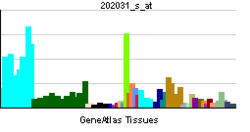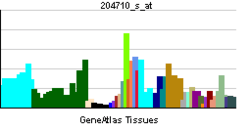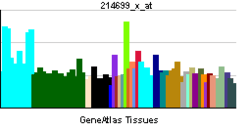WIPI2
| View/Edit Human | View/Edit Mouse |
WD repeat domain phosphoinositide-interacting protein 2 is a protein that in humans is encoded by the WIPI2 gene.[3][4]
Function
WD40 repeat proteins are key components of many essential biologic functions. They regulate the assembly of multiprotein complexes by presenting a beta-propeller platform for simultaneous and reversible protein-protein interactions. Members of the WIPI subfamily of WD40 repeat proteins, such as WIPI2, have a 7-bladed propeller structure and contain a conserved motif for interaction with phospholipids.[3][4]
WIPI2 is the mammalian homolog of Atg18, not Atg21, along with the closely related protein, WIPI1. WIPI2 mRNA is readily detectable in several commonly used laboratory cell lines (HEK293A, HeLa, A431) and several cancer cell lines, while WIPI1 expression is limited to cancer cells.
The Atg proteins regulate autophagy, which is a lysosomal degradation pathway required for maintaining cell health, surviving periods of nutrient deprivation and also plays a role in cancer, neurodegeneration and immune responses to a diverse range of pathogens.[5] WIPI2 is recruited early to the forming autophagosome, along with DFCP-1, ULK-1 and Atg16, where it positively regulates the lipidation of Atg8 (LC3). Interestingly, this is not true for WIPI1.
See also
References
- ↑ "Human PubMed Reference:".
- ↑ "Mouse PubMed Reference:".
- 1 2 Proikas-Cezanne T, Waddell S, Gaugel A, Frickey T, Lupas A, Nordheim A (Dec 2004). "WIPI-1alpha (WIPI49), a member of the novel 7-bladed WIPI protein family, is aberrantly expressed in human cancer and is linked to starvation-induced autophagy". Oncogene. 23 (58): 9314–25. doi:10.1038/sj.onc.1208331. PMID 15602573.
- 1 2 "Entrez Gene: WIPI2 WD repeat domain, phosphoinositide interacting 2".
- ↑ Orsi A, Polson HE, Tooze SA (December 2009). "Membrane trafficking events that partake in autophagy". Curr Opin Cell Biol. 22 (2): 150–6. doi:10.1016/j.ceb.2009.11.013. PMID 20036114.
* Polson HE, de Lartigue J, Rigden DJ, Reedijk M, Urbé S, Clague MJ, Tooze SA (2010). "Mammalian Atg18 (WIPI2) localizes to omegasome-anchored phagophores and positively regulates LC3 lipidation". Autophagy. 6: 506–22. doi:10.4161/auto.6.4.11863. PMID 20505359.
Further reading
- Mehrle A, Rosenfelder H, Schupp I, et al. (2006). "The LIFEdb database in 2006". Nucleic Acids Res. 34 (Database issue): D415–8. doi:10.1093/nar/gkj139. PMC 1347501
 . PMID 16381901.
. PMID 16381901. - Wiemann S, Arlt D, Huber W, et al. (2004). "From ORFeome to Biology: A Functional Genomics Pipeline". Genome Res. 14 (10B): 2136–44. doi:10.1101/gr.2576704. PMC 528930
 . PMID 15489336.
. PMID 15489336. - Gerhard DS, Wagner L, Feingold EA, et al. (2004). "The Status, Quality, and Expansion of the NIH Full-Length cDNA Project: The Mammalian Gene Collection (MGC)". Genome Res. 14 (10B): 2121–7. doi:10.1101/gr.2596504. PMC 528928
 . PMID 15489334.
. PMID 15489334. - Ota T, Suzuki Y, Nishikawa T, et al. (2004). "Complete sequencing and characterization of 21,243 full-length human cDNAs". Nat. Genet. 36 (1): 40–5. doi:10.1038/ng1285. PMID 14702039.
- Hillier LW, Fulton RS, Fulton LA, et al. (2003). "The DNA sequence of human chromosome 7". Nature. 424 (6945): 157–64. doi:10.1038/nature01782. PMID 12853948.
- Strausberg RL, Feingold EA, Grouse LH, et al. (2003). "Generation and initial analysis of more than 15,000 full-length human and mouse cDNA sequences". Proc. Natl. Acad. Sci. U.S.A. 99 (26): 16899–903. doi:10.1073/pnas.242603899. PMC 139241
 . PMID 12477932.
. PMID 12477932. - Simpson JC, Wellenreuther R, Poustka A, et al. (2001). "Systematic subcellular localization of novel proteins identified by large-scale cDNA sequencing". EMBO Rep. 1 (3): 287–92. doi:10.1093/embo-reports/kvd058. PMC 1083732
 . PMID 11256614.
. PMID 11256614. - Wiemann S, Weil B, Wellenreuther R, et al. (2001). "Toward a Catalog of Human Genes and Proteins: Sequencing and Analysis of 500 Novel Complete Protein Coding Human cDNAs". Genome Res. 11 (3): 422–35. doi:10.1101/gr.GR1547R. PMC 311072
 . PMID 11230166.
. PMID 11230166. - Hartley JL, Temple GF, Brasch MA (2001). "DNA Cloning Using In Vitro Site-Specific Recombination". Genome Res. 10 (11): 1788–95. doi:10.1101/gr.143000. PMC 310948
 . PMID 11076863.
. PMID 11076863. - Lai CH, Chou CY, Ch'ang LY, et al. (2000). "Identification of Novel Human Genes Evolutionarily Conserved in Caenorhabditis elegans by Comparative Proteomics". Genome Res. 10 (5): 703–13. doi:10.1101/gr.10.5.703. PMC 310876
 . PMID 10810093.
. PMID 10810093. - <Please add first missing authors to populate metadata.> (1999). "Toward a complete human genome sequence". Genome Res. 8 (11): 1097–108. doi:10.1101/gr.8.11.1097. PMID 9847074.


